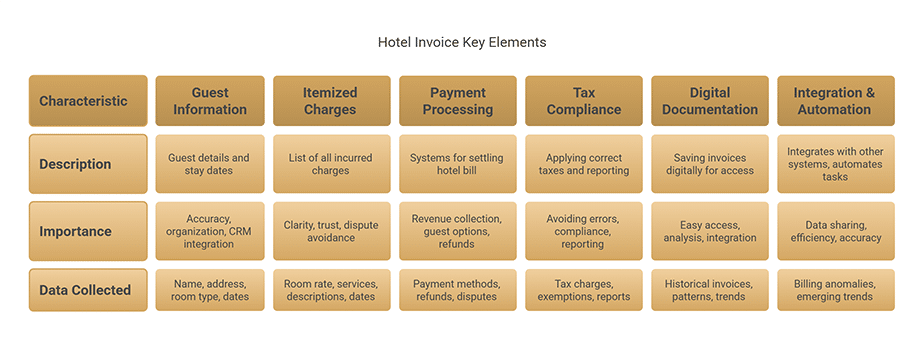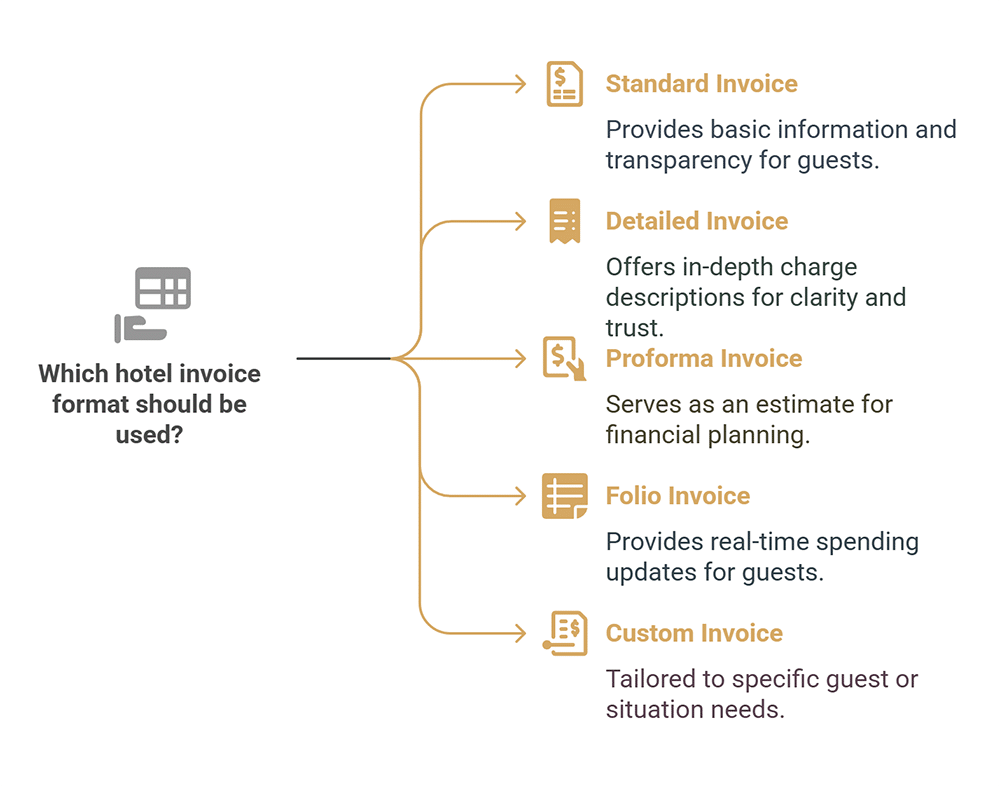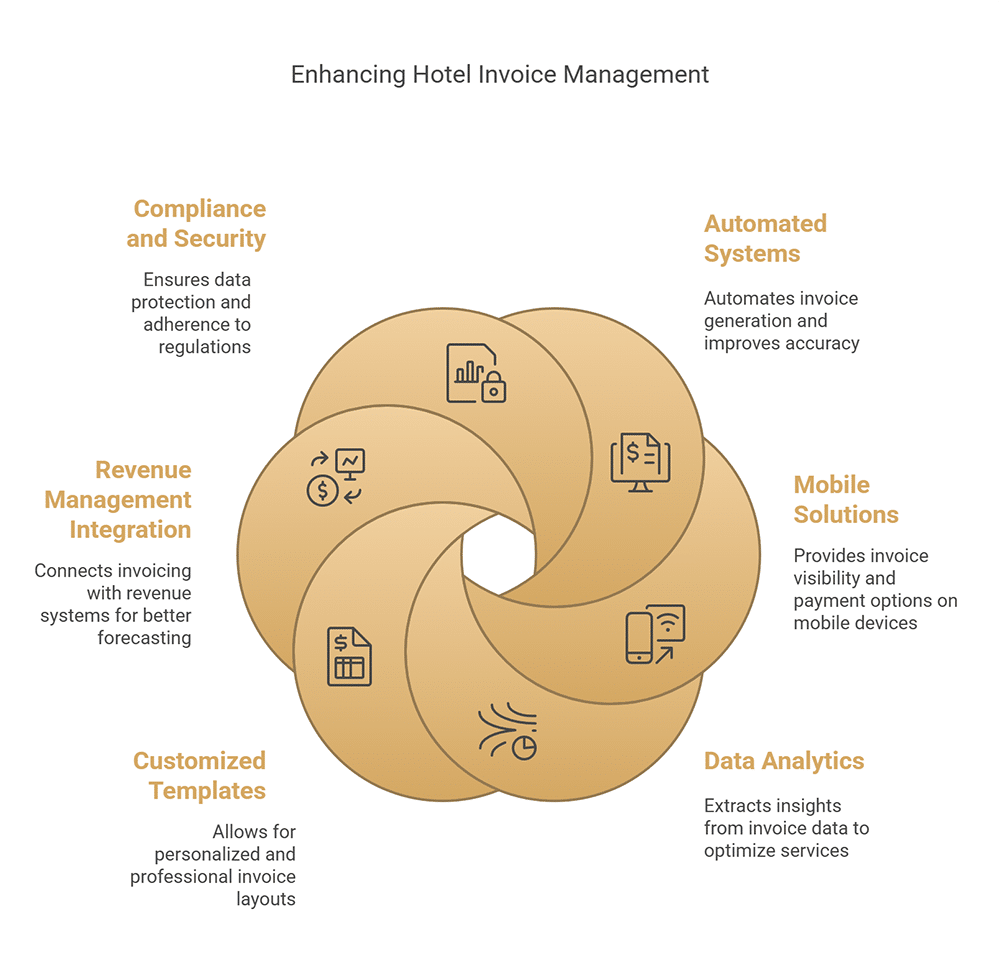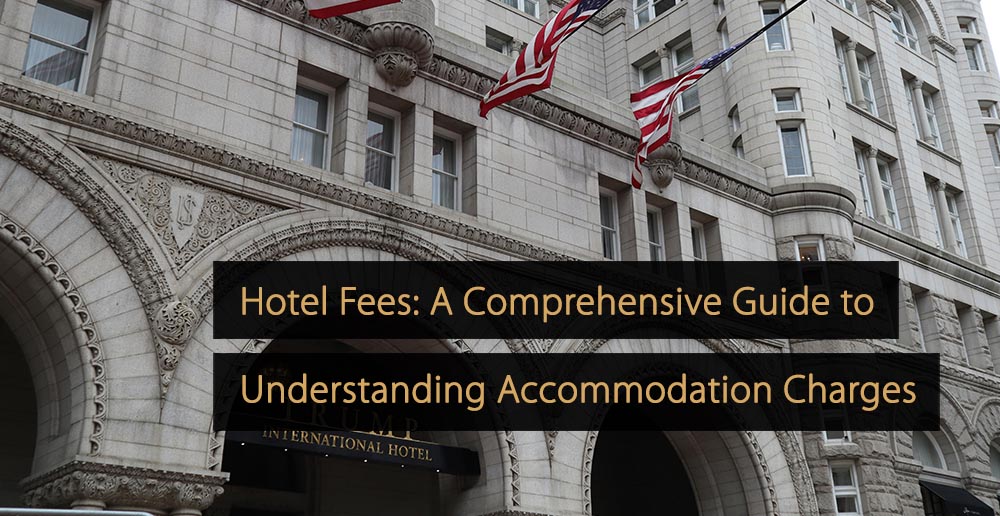A hotel invoice is a document presented to guests at the end of their stay, breaking down the charges they have incurred. This can include the room rate, additional services they used, taxes and more.
Hotel invoices are essential for maintaining accurate financial records and providing guests with a transparent overview of charges. They can assist with compliance, preventing disputes and helping you to understand revenue patterns.
In this article, you can explore the main components of a hotel invoice, learn about different invoice types and gain an understanding of some of the relevant strategies and best practices hotel professionals can use.
Table of Contents:
- Understanding Hotel Invoices: What Are They?
- Why Are Hotel Invoices Important?
- Key Elements of a Professional Hotel Invoice
- Understanding Different Hotel Invoice Formats
- Strategic Approaches to Hotel Invoice Optimization
- Essential Hotel Invoice Best Practices
- Advanced Hotel Invoicing Tips
- Tipping Hotel Housekeeping Staff: Etiquette and Expectations
- Optimizing Guest Check Outs: Top Tips and Best Practices
Understanding Hotel Invoices: What Are They?
A hotel invoice is a document, which outlines the various charges a guest has incurred over the course of their stay. From a customer perspective, this is a hotel bill, outlining what they have to pay.
Hotels will typically present the hotel invoice at the end of a guest’s stay. It will include a breakdown of charges, such as the base room costs, taxes and charges associated with other services used, such as room service.
Most modern hotels will use software to automate the creation of each hotel invoice. As guests use various services during their stay, charges can be automatically added to the final room bill.
Why Are Hotel Invoices Important?
Each hotel invoice you produce is important to your hotel business and to the guest it relates to, providing transparency. It allows guests to understand their final room bill and ensures you earn the correct revenue for services provided.
By creating hotel invoices, you can keep accurate financial records, outlining charges for each guest. Breaking down these fees and clearly presenting information to guests also helps you to avoid payment disputes.
Creating a database of hospitality invoice records can assist with tax compliance by confirming that appropriate tax charges were issued. You can also potentially analyze this database to extract valuable insights.
Key Elements of a Professional Hotel Invoice
In the following sections, you can explore the main elements of a professional hotel invoice issued to guests.
Video: Hotel Receipt Template | Create a Professional Receipt for your Vacation Rental
Guest Information and Stay Details
A hotel invoice will include information about the guest, along with details about their stay. It may include their name and address, as well as their room type, arrival date and check out date.
This is important for overall accuracy of record-keeping and to ensure each invoice has been issued to the right guest. It also helps you to organize invoices when you are storing them for future use.
Modern hotels will usually keep guest profiles within customer relationship management software. Hotel stay invoices with guest information can be easily added to these profiles, making them easy to find in future.
Itemized Charges and Services
Itemized charges and services are a list of the various charges the guest has incurred during their stay. This may include the room rate and fees for room service, the hotel minibar, spa services and more.
These charges are listed individually, so they can be easily understood by your hotel staff and the guest. This is important for establishing trust, providing clarity and avoiding disputes.
A good hotel invoice may include the service(s) used, when the charge was added to the invoice and a description of the service. This not only helps with understanding, but also adds valuable information for you to analyze later.
Payment Processing and Settlement
Payment processing and settlement refers to the systems used for actually settling a hotel bill or stay invoice. Your hotel invoice system needs to include options for processing multiple payment methods.
This is important for ensuring your hotel actually collects the money it is owed and for ensuring guests have options to settle their bill. You should also have systems in place for dealing with refunds and disputes too.
Your invoice system should allow you to collect data about how the hotel bill was settled. Some of the popular payment methods hotels accept include credit cards, debit cards, cash, cryptocurrencies and digital wallet payments.
Tax Compliance and Reporting
Your hotel invoice system should apply the right tax charges to each room bill, factoring in potential exemptions. It should also be able to create compliance documents, serving as proof that taxes were issued.
Taxes are a complex area, with certain items being tax exempt and different destinations having different rules. Compliance and reporting functionality helps to avoid errors and oversights that could lead to costly penalties.
A reliable tax compliance and reporting system ensures guests are not overcharged or undercharged. Your system should also allow you to use the data from guest invoices to create tax reports for specific time periods.
Digital Documentation and Storage
Hotel invoice software should include digital documentation and storage functions, allowing you to save invoices. This makes it easy to access historical invoices in future and can also allow you to analyze them too.
Digital documentation enables you to search for an invoice, link it to a customer profile, or pick out patterns or trends. These digital documents can also be integrated with other hotel systems.
In terms of storage, your hospitality invoice system should include secure backups to avoid data loss. It is important that documents are stored safely, using encryption to guarantee guest privacy and security.
Integration and Automation Features
A robust hotel invoice system will integrate with wider systems, including property management software and customer relationship management software. It will also include automation components.
Integration allows data to be easily shared between systems, making the process of creating, managing and storing invoices easier. Automation, meanwhile, can boost efficiency and accuracy, avoiding human error.
Some of the more advanced uses of hotel technology in this area include the deployment of AI to detect billing anomalies or identify emerging trends. This may allow you to improve billing accuracy and spot revenue patterns.
Understanding Different Hotel Invoice Formats
The format used for a hotel invoice can vary, depending on the circumstances. In the sections that follow, you can dive deeper into some of the most common formats for a hospitality invoice.
Video: How to Make a Professional Invoice in Excel | Proforma Invoice
Standard Hotel Invoice
A standard or basic hotel invoice can be thought of as the starting point for hotel bill documents. It will include guest information and an overview of the various charges guests have amassed during their stay.
Standard invoices are vital as an anchor for your wider approach to invoice formats. They also offer transparency and provide guests with easy-to-understand information about how their final bill has been calculated.
On a standard invoice, you will see the room rate, service charges, tax information and a final bill amount. Most invoices will also feature hotel branding elements, such as the company logo.
Detailed Invoice
As the name indicates, a detailed hotel invoice goes into greater depth than a standard hotel invoice. It will usually include not only a breakdown of charges, but also time stamps and descriptions of each charge.
With a detailed stay invoice, there is greater clarity and less ambiguity around charges. Each and every charge is not only documented, but can be precisely identified, helping to prevent disputes.
For guests, in-depth invoices can be harder to understand, but inspire a greater degree of trust. For hotels, these documents can also be useful for analysis and proof of compliance.
Proforma Invoice
A proforma hotel invoice is a preliminary hotel bill, which serves as an estimate of guest charges. It is presented to guests before their stay and is not a legally binding bill, functioning more like an informal quote.
Within the hotel industry, proforma invoices can help with financial planning by providing a basic estimate for revenue. These documents also give guests an indication of the kind of costs they are likely to face.
This format will usually provide an overview of estimated room charges, taxes and discounts. The document may also outline your hotel’s cancellation policy and explain any possible service charges not included in the estimate.
Folio Invoice
A folio invoice is a real-time log of guest spending. It is a continuously updated document, outlining the various charges a guest has incurred so far, in chronological order.
Folio invoices are useful for providing up-to-date information on the current status of a guest’s bill. This can help hotels to plan financially and also enables guests to understand their spending up until that point.
Maintaining folio invoices does require integration with wider hotel systems, but the benefits can be worthwhile. The transparency associated with a folio invoice can increase customer satisfaction and trust.
Custom Invoice
A custom hotel invoice is an invoice where the format is tailored to the specific requirements of the situation. It may include elements of various other hospitality invoice formats.
Custom invoices are important because they allow a hotel to adapt to unusual or unique circumstances. This can be especially useful for building and maintaining positive relationships with key customers.
A hotel may need to create a custom invoice for a VIP, or for guests with special requirements. You may also need to provide an invoice in a different language, or create unique invoices for customer loyalty program members.
Strategic Approaches to Hotel Invoice Optimization
Here, you can read about some of the best strategies for optimizing your hotel invoice system:
Automated Hotel Invoice Systems
Automation within your hotel invoice system allows hotel bills to be automatically calculated and generated. This can even be an on-going, real-time process, providing excellent transparency.
Ultimately, automating elements of your hotel invoicing can improve accuracy by preventing human error. It can also ease employee workloads and allow staff to focus on hotel operations that need hands-on attention.
Effective automation requires you to integrate billing with wider hotel systems. This allows data to be shared between applications, so your invoices are up-to-date and include the latest charges.
Mobile Hotel Invoice Solutions
Mobile hotel invoice solutions encompass various methods for providing invoice visibility on mobile devices. This can include offering real-time invoices within a mobile app, or using invoicing software with mobile accessibility.
Given the prevalence of mobile devices and increasing expectations for mobile offerings, offering these solutions can help to maintain guest satisfaction. It also offers greater convenience for hotel staff and allows for paperless invoicing.
Some of the best mobile offerings also include built-in mobile payment functionality. This can allow guests to settle their bill without having to go to the reception desk, resulting in seamless, contactless check outs.
Data Analytics for Service Optimization
Digital storage of hotel invoice documents opens up the possibility for data analytics. This can allow you to extract insights about customer behavior, spending patterns, revenue trends and much more.
The use of data analytics with invoicing allows you to better understand your guests. As a by-product, it becomes easier to make changes to services and operations and manage resources, so you maximize customer satisfaction.
By tracking key performance indicators, you can understand where your hotel is going right and where improvements can be made. AI technology also allows for much of the analysis to be performed automatically.
Customized Hotel Invoice Templates
Hotel invoice templates serve as the basis for creating an invoice. Customized templates allow you to choose the layout and which features to include, so you can easily switch between multiple invoice formats.
Customization is important for presenting different invoice layouts, but also for making sure your invoices appear professional. You can include branding and design elements to improve the visual quality of the documents.
Using templates is far less time-consuming than creating invoices from scratch and helps to deliver a more consistent end result. At the same time, continuous customization of templates is possible, allowing you to update your invoice style, add support for additional languages, or provide hotel room bills for different currencies.
Integration with Revenue Management Systems
Your hotel invoice system should be interconnected with revenue management systems. This allows you to share data between software packages, understand where money is being spent and create more accurate forecasts.
When invoicing and revenue management are integrated, evidence-based pricing adjustments can be made. You can then maximize earnings and profit and stay competitive with other hotels.
Forecasting and understanding spending patterns is crucial for financial planning. It can allow you to set realistic budgets, prepare for downturns in demand and assess the effectiveness of promotions and special offers.
Compliance and Security Protocols
Adopting strict protocols around compliance and security allows you to make sure you protect data and privacy. It also helps to ensure you are meeting obligations regarding tax and payment processing.
This is important because hotel guests deserve to feel like their personal information is safe with your hotel. It also helps you to avoid financial penalties associated with non-compliance.
Make sure you are using systems with data encryption and backup options. A cloud-based invoicing software solution allows you to avoid having a single point of failure and can make data accessible from a wide range of devices.
Essential Hotel Invoice Best Practices
Below, you will find an overview of some of the most critical hotel invoice best practices to keep in mind:
- Hotel Invoice Format: Use hotel invoice templates that provide a clear and logical format. Break down the hotel bill into distinct sections, such as guest information, itemized charges, taxes and payment information.
- Digital Integration: Create a robust hotel invoice system, integrated with wider hotel systems, including your property management and CRM systems. This allows for easy data sharing.
- Detailed Documentation: Keep in-depth records of guest charges, tax information and service usage. Include timestamps, when possible, along with service descriptions to ensure full transparency.
- Payment Processing: Have clear processes in place for handling payments. Provide support for a variety of payment methods to reduce friction, including cash, credit and debit cards, and digital payments.
- Dispute Resolution: Have clear procedures in place for disputes over a hotel invoice, so that bills can be clarified, mistakes can be corrected and guest satisfaction can be maintained.
- Continuous Compliance: Create a robust and continuous strategy for compliance with rules and regulations around tax, financial reporting, privacy and data security.
Advanced Hotel Invoicing Tips
Here, you can find a brief overview of some useful tips to take your hotel invoice system to the next level:
- Automated Billing: Implement software and AI solutions that allow calculations, error detection and bill generation to occur automatically. This can boost efficiency and accuracy.
- Real-Time Updates: Integrate your hotel invoice system with wider hotel systems to allow for real-time data sharing. Keep digital invoices up-to-date, with time stamps, and avoid unnecessary disputes.
- Multi-Currency Support: Allow guests to pay for their stay using their preferred currency. Have systems in place to automatically convert your hotel invoice into their preferred currency to improve understanding.
- Digital Archiving: Create a system for storing each hotel bill or stay invoice digitally. Make sure this archiving system complies with regulations and makes it easy to search for individual records.
- Guest Profiles: Connect each hotel invoice with a guest profile. Use invoices to add to customer data around preferences, spending patterns and behavior so you can improve personalization.
- Mobile Integration: Offer options for digital invoices to be sent to mobile devices. This can facilitate paperless hospitality invoices and improve your hotel’s green credentials.
Tipping Hotel Housekeeping Staff: Etiquette and Expectations
One of the potential guest expenses that will not show up on a hotel invoice is the tipping of hotel housekeeping staff. While not mandatory, it is generally considered good etiquette to leave a small tip for staff who help to keep guest rooms tidy, safe and clean. Tips are greatly appreciated by the workers and can boost morale.
In the “Tipping Hotel Housekeeping; What is the Standard?” article, you can find a complete exploration of the etiquette, best practices and expectations around providing a tip for housekeeping staff.
Optimizing Guest Check Outs: Top Tips and Best Practices
Providing a hotel invoice or room bill is one of the major parts of the guest check out process, but hotels need to take additional steps to optimize this experience. Examples can include personalizing your check out procedures, providing a degree of flexibility to check out times, and following up with guests after they leave.
In the “Check Out Hotel Processes: Tips to Optimize Guest Check Outs” article, you will find more details on the ways hotels can enhance the check out experience and leave guests with a positive impression.
Did You Like This Article about Hotel Invoice?
You might also be interested in the following articles:
- Hotel Bill Format: Essential Guidelines for Professional Hospitality Invoicing
- Hotel Financing: Learn How to Finance Your Hotel Business
- Hotel Budget: Effective Budgeting Tips for Hoteliers
- Hotel Budget Plan: Practical Budgeting Tips for Hoteliers
- Hotel Owners: Understanding the Role of a Hotel Owner
A hotel invoice breaks down the various charges guests have incurred over the course of their stay. These documents are important for hotels and guests alike, providing clarity over billing processes, allowing disputes to be resolved, providing proof of compliance with legislation and offering opportunities for data analysis.
More Tips to Grow Your Business
Revfine.com is the leading knowledge platform for the hospitality and travel industry. Professionals use our insights, strategies, and actionable tips to get inspired, optimize revenue, innovate processes, and improve customer experience.Explore expert advice on management, marketing, revenue management, operations, software, and technology in our dedicated Hotel, Hospitality, and Travel & Tourism categories.
This article is written by:
Hi, I am Martijn Barten, founder of Revfine.com. With 20 years of experience in the hospitality industry, I specialize in optimizing revenue by combining revenue management with marketing strategies. I have successfully developed, implemented, and managed revenue management and marketing strategies for individual properties and multi-property portfolios.











Leave A Comment